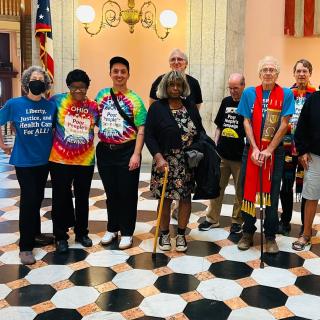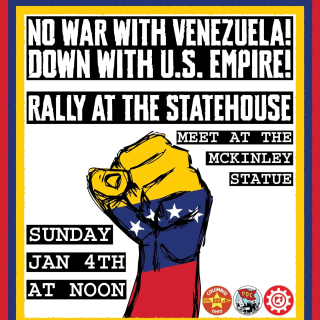Hearings in the Ohio Legislature this week (Tuesday and Wednesday) will underscore opposition to the proposed mega-bailout meant to keep the decrepit Davis-Besse and Perry nukes operating to ultimate failure.
PLEASE go there to testify.
Here are some key talking points (in progress). Please insert your own:
Physical status of the plants:
1) These two Nukes are literally crumbling (see work by Kevin Kamps/Beyond Nuclear, Mike Keegan, and more)
2) The shield building at Davis-Besse is swiss cheese…pock-marked with holes caused by moisture getting into the cracks, then expanding in cold weather, then melting in thaws. It could easily drop heavy chunks onto vital components.
3) At more than 40 years old, there has been no recent comprehensive inspection of DB by an independent agency to check for cracking, embrittlement, incomplete maintenance, etc. Such an inspection must be a pre-requisite for any major investment by the public, and must be subjected to public hearings. Does one buy a used car without seeing if the block is cracked or if the brakes work?
4) Davis-Besse is a clone of Three Mile Island Unit 2, which melted in 1979. DB had a “mishap” that was a precursor to the TMI core melt (where about half the fuel melted). TMI’s owners later sued for not having been fully informed of what happened at DB, saying they might have avoided their own accident had they known about DB’s.
5) DB construction began in September, 1970, meaning it was largely designed in the 1960s, six decades ago, well before the computer revolution.
6) In 2002 DB suffered its unique “hole-in-the-head” incident in which boric acid ate nearly all the way through the pressure vessel, coming within 3/5th of an inch of opening an apocalyptic catastrophe irradiating the north coast and Great Lakes.
7) The hole was discovered by accident, not regular inspections, when a worker leaned on a component that fell over.
8) Attempts to fix the boric acid leak failed.
9) Unique in all the world, DB’s owners cut through the containment to insert and paste on the head from the unused Midland reactor, which was stopped by citizen action. This insane stunt is totally without precedent or parallel testing. In fact there is no way to know how long this bizarre “fix” will hold.
10) Perry was the first US nuke damaged by an earthquake (since has come North Anna). In January, 1986, before it opened (and concurrent with the Challenger disaster), Perry was dangerously shaken. Nearby roads and bridges were damaged. Thankfully it was not yet operating. But there is no evidence of significant official testing of how operators might fare trying to operate a nuke while being shaken. We have, however, seen what happened at Fukushima, where some believe the quake caused Unit One to begin melting before the arrival of the tsunami.
11) Construction began at Perry in 1974, meaning it too was largely designed in the 1960s.
12) Perry opened in 1987, making it 32 years old, also in need of independent inspection before attracting huge public investment.
13) With FE in bankruptcy, the demand for inspections independent of the NRC have added legal legitimacy; the Atomic Energy Act of 1957 gives the Commission rule over safety issues; it has no clear jurisdiction in economic issues pertaining to the reactors’ assessed value in bankruptcy or for further public investment. Why would any investor buy in without fully inspecting the “asset” being propped up.
14) The bankruptcy court, and the creditors’ committee, must demand an independent assessment of the value of Perry/DB as assets, which cannot be reasonably done by the NRC, and must be done by an independent agency of the court and of the tax/ratepayers being expected to bail out these machines of undetermined real value.
Health Impacts
1) All nukes emit deadly radiation.
2) Downwind infant death rates rise when a nuke opens; they drop when it shuts (see Radiation Health Project).
3) People and animals died at Three Mile Island (see KILLING OUR OWN free on line). I was in central Pennsylvania a year after the accident and interviewed many of the victims, as well as witnessing the impact on the animals there.
4) A TMI/Chernobyl/Fukushima disaster is a definite, increasingly likely possibility at both Perry and DB, especially as they age even further.
Environmental Impacts
1) Cooling towers, as at Perry and Davis-Besse, kill far more birds than modern industrial wind turbines, solar panels, batteries or LED/efficiency.
2) Heat emissions from steam and hot water at Perry/DB kill trillions of marine creatures and unbalance Lake Erie’s eco-system; renewables emit no such heat.
3) All nuclear plants emit radiation, heat and Carbon 14, which kill eco-systems and unbalance weather patterns.
4) No reactor is “Zero Emission”.
5) All reactors create both low and high-level radioactive waste, for which there is no realistic management plan.
6) Claiming nukes ight global warming is like “heating the planet to cool it.”
7) At issue also is FE’s ability to manage these nukes; its predecessor blacked out the entire northeast in 2003; its tenuous financial status calls into question its managerial competence.
Economics
1) The status of the decommissioning funds is unclear and needs a thorough investigation.
2) These nukes can’t compete with methane, solar, wind or increased efficiency. Nukes are an old, dying industry versus renewables which are new and rising. Why invest in the failed “too cheap to meter” failed technology of the past?
3) The Legislature’s senseless anti-wind setback clause is purely Luddite, stopping $4 billion in private investment ready to build northern Ohio wind farms that would quickly and cleanly provide the power now being produced by the nukes. Lifting that barrier would allow private wind turbine investment to pour into the north coast, completely obliterating any demand for Perry/DB.
4) Northern Ohio is an extraordinary wind site because the land is flat, there is plenty of transmission, the sites are near cities, the farmers want the income and they can be up and running within two years—-for at least thirty to come;
5) The north coast wind projects will produce billions in cheap electricity and thousands of good long-term jobs…far more than at Perry & Davis-Besse;
6) This does not include future wind turbines in Lake Erie itself, one of the best wind sites in the world.
6) The $XXX million/year FirstEnergy wants to keep its nukes running would pay to complete replace the capacity of both nukes within ten years…except that money would be coming from private investors rather than a public handout;
7) Ohio is actually now one of the top states for manufacturing wind turbine components; why not expand that business with local wind farms?
8). Gouging so much money out of the Ohio economy in higher rates and subsidies will cripple its ability to grow and prosper for decades, especially in contrast to other states that do not levy such a resource-draining tax on its people and industries.
9) Except for a paltry $12 billion fund, these reactors are uninsured. A major accident at either one will immediately make FE disappear and will bankrupt the state forever.
10) A significant opponent of the bailout is the National Taxpayers Union, along with other conservative industrial and anti-tax organizations, ready to make cross-over alliances.
11) Investing this money in renewables will create far more jobs than investing in these dying nukes.
12) The nuclear work force is aging and in serious danger of depletion to the point where there won’t be enough skilled, well-trained workers to run these nukes.
12a) We want plant workers retained at Perry/DB for as many years after their shut-downs as it takes to guarantee safe decommissioning. Nobody knows these plants better than the workers at the sites. We want them employed there until the reactors are fully taken down and buried, which means many years…well into the retirement period for many of them.
13) The shut-down package negotiated for Diablo Canyon in California included significant “retain & retrain” money to keep workers at the site while retraining them for future work in renewables.
14) The solar industry needs to be unionized in part to give it the organized clout needed to fight this bailout and others like it.
15) More than a quarter-million Americans now work in the solar industry; more than 100,000 in wind, far more combined than in coal, oil or nuclear.
16) California’s solar industry alone employs more workers than there are Americans digging coal.
17) This bailout would seriously cripple the job-creating market in Ohio; it is a job-killing program rather than job-creating one.




